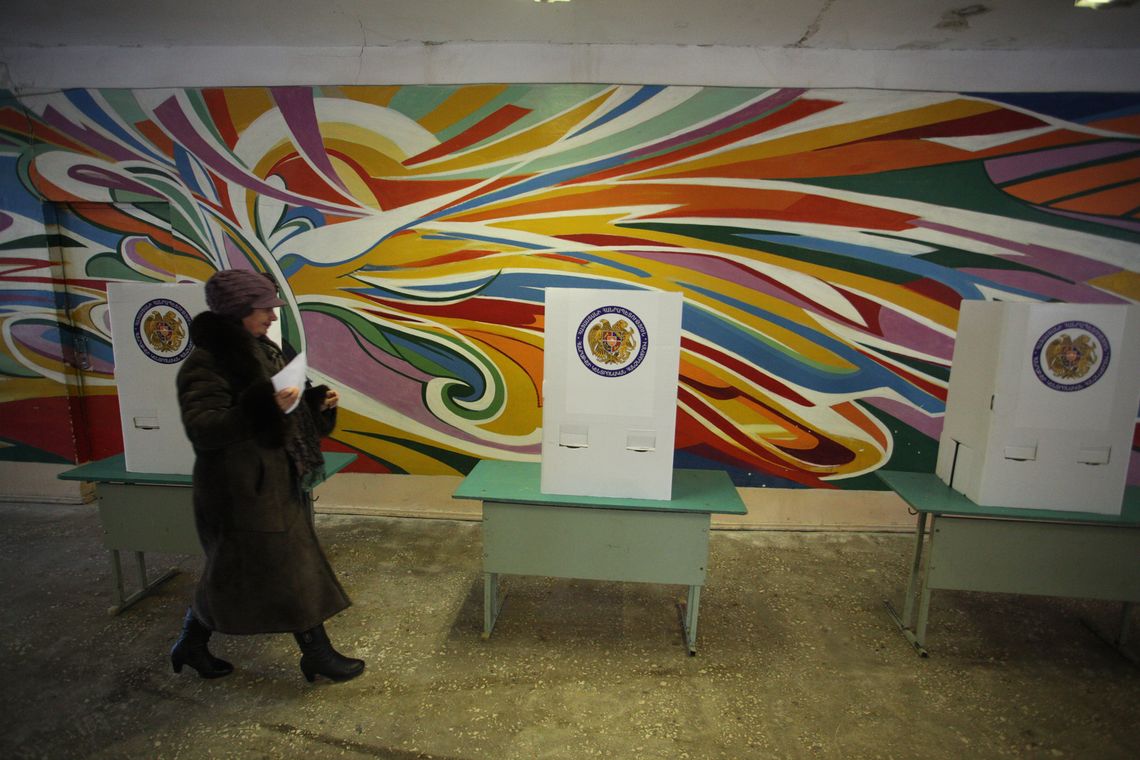Thu Mar 16 2017 · 6 min read
Political Arrangements Ahead of Parliamentary Elections

By Armen Grigoryan

The approaching parliamentary elections will be a test for how crisis-plagued Armenia governs itself. Domestic and external pressures have intensified to such a degree that for the last two years, the country’s governance structure is in a seriously critical stage.
The Republican Party of Armenia: At the Root of the Crisis
From August 2014 to January 2017, a number of challenges confronted Armenia:
- August 2014: the Azerbaijani military executed a number of special military operations against Armenian forces
- November 2014: Azerbaijan shot down an Armenian military helicopter;
- January 2015: Russian soldier Valeri Permyakov murdered the members of the Avetisyan family in Gyumri
- January 2015: members of the Founding Parliament (formerly known as Preparliament) were ambushed and attacked in Berdzor by Artsakh’s security forces
- February 2015: Serzh Sargsyan decided and successfully neutralized Gagik Tsarukyan, the leader of the country’s second largest political party
- June 2015: Electric Yerevan protests broke out on Baghramyan Street against electricity rate hikes
- December 2015: the results of the constitutional referendum were marred by mass violations
- April 2016: Azerbaijan instigated a war
- July 2016: the “Daredevils of Sassoun” (commonly known as Sasna Dzrer after the Armenian national epic Daredevils of Sassoun) launched an uprising and seized a police regiment building
All of these crises reflect deeply rooted problems in the regime.
The Republican Party of Armenia (RPA), the leading political party since 2007 and led by Serzh Sargsyan, carries the burden of responsibility for the current situation. The RPA has periodically failed in areas of strategic importance for the country.
Between 2008 and 2015 alone, 350,000 citizens migrated from Armenia. The country’s foreign debt stood at 1.9 billion USD in 2009 and peaked at 5.9 billion USD in 2016. For the first time since 1994, 800 hectares of land was lost to Azerbaijan during the Four Day War. The poverty rate has steadily increased: in 2008 the number of poor was 26 percent, later reaching 30 percent in 2016. In 2008 the GDP of Armenia was 11.7 billion USD, whereas in 2015 it was 10.5 billion USD. According to Transparency International’s 2016 Corruptions Perceptions Index and the 2016 Democracy Index published by the Economist’s Intelligence Unit, Armenia has recorded low indices and is actually regressing. In these reports. Armenia is included in the list of countries with authoritarian regimes.
The RPA’s, in particular, Serzh Sargsyan’s policy has resulted in the overall systemic crisis, and Serzh Sargsyan himself is to blame for the current state of the country.
The Complete Seizure of Power
Since 2007, the RPA has politicized the entire state apparatus. The RPA expanded its influence by having everyone from employees of state kindergartens to different government agencies become members of the party. Even critical pan-national decisions were being made at the party level. The most vivid representation of this was in 2015 during the escalation of the political conflict between Serzh Sargsyan and Gagik Tsarukyan. At the meeting of the RPA Council, Serzh Sargsyan referred to Gagik Tsarukyan as a political evil and used state institutions in order to isolate him from politics. Such mechanisms demonstrate how a political party has come to substitute state institutions.
The Chances of Opposition Parties
The failures of the RPA have resulted in its low ratings as a ruling power. It may even be said that the majority of the population opposes the party. The RPA does not exercise any influence on this vast majority. On October 2, 2016, during the City Council elections in Vanadzor and Gyumri, the RPA even attempted to participate in the elections in Shirak via a political bloc. During the whole campaign, the RPA’s mayoral candidate in Vanadzor was trying to distance himself from the RPA. The public attitude towards the party forced the candidate to reject his own brand for local elections.
It is under these conditions that Serzh Sargsyan has allowed Gagik Tsarukyan to return to politics, so that the latter may secure a certain portion of the votes for the opposition. If for some reason the RPA alone would not be able to win the elections through falsifications, at least the party would consider the option of building a coalition with Prosperous Armenia.
After the constitutional amendments, within the framework of the new electoral system, it is now virtually impossible to challenge the ruling regime on an individual basis. If in the past, individuals could run for the office of president and challenge the government, today that option no longer exists.
In the past, Vazgen Manukyan, Stepan Demirchyan, Levon Ter-Petrosyan, and Raffi Hovhannisyan confronted the government by proposing their candidacy for presidential elections. Parliamentary elections, which have become the main process of government formation, require strong team competition.
The new system is the very reason that the majority of parties have formed alliances for the upcoming elections. Presently, the opposition will be mobilized within four alliances: Oskanian-Raffi-Ohanyan (ORO), Yelq Bloc, Tsarukyan Bloc and the Armenian National Congress (ANC) – Armenian Democratic Party (ADP) Bloc.
The Role of Civil Society
In recent years, the role of civil society in the election process has expanded. The results of the election observation mission are more conspicuous. The results from the Citizen Observer initiative for the Constitutional referendum indicate that observers had a notable effect on Election Day (December 6, 2015). The Citizen Observer initiative had representatives in 526 out of a total of 1,998 polling stations distributed throughout Armenia’s administrative divisions (marzes). In those polling stations where there were no observers present, voter participation was five percent higher than in those with observers; similarly, the ‘yes’ vote was higher by seven percent and the ‘no’ votes were less by 6.5 percent compared to those polling stations that had observers.
The Citizen Observer initiative is planning to engage approximately 3,500-4,000 observers for the upcoming parliamentary elections. The observers will be distributed in 1,800 out of 2,000 polling stations, which cover 97% of the electorate. There is also an interest among members of the Armenian Diaspora to participate in the observation mission. This is a unique cooperation between the Diaspora and Armenian civil society.
The Threat of War
The Four Day War in April of last year demonstrated that Azerbaijan will attempt to resolve the Artsakh conflict at any cost. Even though the OSCE Minsk Group, charged with mediating a peaceful settlement, has repeatedly released statements on maintaining the ceasefire, the parties still continue small-scale armed operations.
It seems as if Azerbaijan is preparing to repeat the April war scenario. The recurrence of military operations ahead of the parliamentary elections may spark a severe crisis. The problem is that Armenia did not declare war at any stage of the conflict in Artsakh; however, during ongoing military operations, Armenia found itself a de facto war. If Armenia does not declare war, then it cannot declare martial law, and the elections will not be postponed. And conducting elections during an actual war is a serious challenge.
The Elections and the Future of Armenia
The major cause for the present condition of Armenia is the absence of free and fair elections. Serzh Sargsyan and the RPA, who achieved power through falsifications, do not feel responsible for the problems faced by Armenian citizens. They prefer maintaining their power instead of actually resolving the issues the country is facing.
The more Armenia is moving backwards, the more efforts Serzh Sargsyan makes to secure his power. The reason all the reforms undertaken by Sargsyan failed was that they were duplicitous. During the amendments to the electoral code, it was discussed that the majoritarian system would be eliminated in order that oligarchs not be included in the National Assembly. The inclusion of Seyran Saroyan, Samvel Aleksanyan, Artak Sargsyan, Arakel Movsisyan as candidates is evidence of the opposite.
The upcoming parliamentary elections are an opportunity to change the present situation. The active monitoring of elections, as well as active participation of citizens, is the most efficient way to resolve the crisis.


